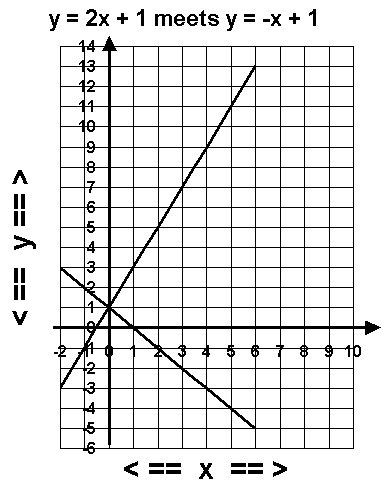Ordered pairs (coordinates )
| © 2004 Rasmus ehf |
Ordered pairs (coordinates ) |
Lesson 3.
Equations and graphs
If you have two equations with two unknown values, there are at least three methods you can use to solve the equations.
Method 1: Plotting the lines in a coordinate system ( grid )
|
Look at the equations I: y = 2x + 1 and II: y = - x + 1. Make a table of values for each equation. |
||||||||||||||||||||||||||||||||||||||||||||||||||||||||||||||||||||||||||||||||||||||||||
|
|
|||||||||||||||||||||||||||||||||||||||||||||||||||||||||||||||||||||||||||||||||||||||||
|
Equation I |
Equation II |
|||||||||||||||||||||||||||||||||||||||||||||||||||||||||||||||||||||||||||||||||||||||||
If one or more common points can be found, the lines cross. Plot the lines on a grid.

Here you see that the lines cross at the point (0,1). Notice that these lines have different gradients ( slopes ). Lines with different gradients always cross whereas different lines with the same gradient are parallel and therefore never cross.
Method 2: Adding the equations
Finding where the lines cross or intersect is the same as solving the equations. We can solve the equations by adding multiples of the equations together.
I: y = 2x +1
II: y = -x + 1
Begin by rearranging the equations:
I: -2x + y = + 1
II: x + y = 1
Multiply equation II by 2 to get 2(x + y = 1) or 2x + 2y = 2.
Add the equations:
I: -2x + y = 1
II: 2x + 2y = 2
0 + 3y = 3 therefore y = 1.
Substitute this value
for y in Equation I to
get the result -2x + 1 = 1.
Then move the unknown value to the right: 1 = 2x + 1.
Move the known values to the left side of the equation to get: +1 -1 = 2x or
0 = 2x. The result is x = 0.
This is the same result as was found by plotting the lines on a grid. The point (0, 1) is the only point that the two lines have in common.
Method 3: Substitution
Both conditions are true only when the lines cross. Therefore, we can say that y in Equation I and y in Equation II are the same at that point.
I: y = 2x +1
II: y = -x + 1
If we substitute the
expression for y from
Equation II into Equation I, we get the expression
-x + 1 = 2x + 1.
Move the known values to the left so that all the values are positive.
-1 + 1 = 2x + x or 0 = 3x The result is x = 0.
Substitute the value for x in Equation I to get y = 2·0 +1 = 0 + 1 = 1.
The lines cross at the point (0,1) as above.
It is important to understand these 3 methods if you plan on studying further maths.
Try Quiz 3 on Ordered pairs (equations and graphs).